Democracy Now! 15 August 2005
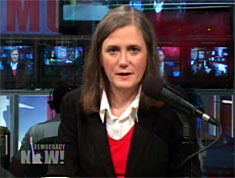
Amy Goodman, Democracy Now!
At midnight, borders into the settlements were sealed and it became illegal for Israeli civilians to remain in the Gaza Strip. Thousands of soldiers are deploying today to inform residents of the 21 Gaza settlements and four of 120 West Bank settlements that they have two days to move out voluntarily. After civilian relocation is complete, the Israeli military will gradually pull out. The Palestinian Authority is scheduled to govern Gaza by the end of the year, marking the first time in decades that Palestinians will control the territory.
The pullout is seen by some as a strategy by the Israeli state to consolidate its hold over the West Bank and East Jerusalem. Others see it as a necessary step in the roadmap to peace in Israel-Palestine. Palestinian President Mahmoud Abbas sought to convey a sense of unity and cooperation in his remarks on the withdrawal yesterday.
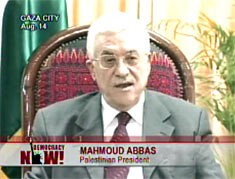
Mahmoud Abbas, Palestinian President
“We want for the settlers and the army to leave in peace and security, without any undue incidents. That is what we are trying to achieve now. If you go out into the streets now, you will discover that there is complete agreement among all of the Palestinian citizens and all of the factions. Everyone is calling for a smooth and quiet withdrawal.”
The Israeli Defense Forces are prepared to reoccupy all of Gaza if they meet any resistance from Palestinian groups.
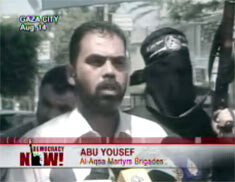
Abu Yousef, Al-Aqsa Martyrs’ Brigades
“The Zionist enemy should understand that the resistance is not over and our attacks will not have any barriers. Threatening our sites only reassures us to keep our weapons and operations.”
A majority of Israelis support the withdrawal, but thousands of settlers are so far refusing to leave. The Israeli government is offering all settlers compensation and new housing outside of Gaza.
The settlements were originally established after the 1967 “Six-Day War” when Israel claimed land outside its internationally recognized borders.
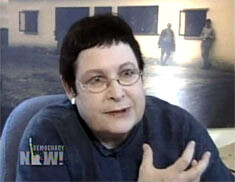
Idith Zertal, Israeli historian
“A settlement was a main objective in Zionist ideology and practices and after the 1967 war, the Six-Days war, the settlements were, I could say, almost kidnapped by the Zionist religious group or movement in Israel in creating the settlements beyond the Green Line, beyond the international border”
Settlers are planning to use a variety of methods to resist relocation. This is a resident of one of the fifteen southern Gush Katif settlements.
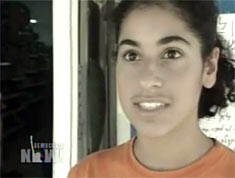
Gush Katif Resident
“We believe that this program that (Israeli Prime Minister Ariel) Sharon, it is not going to happen. No matter what happen we will not leave this place because it’s our country, you can’t give it to our enemies so we stay here and fight. We will not fight with our soldiers because they are our brothers but we are not going to let them take us out of here.”
Several dozen Israeli soldiers have so far refused to implement the relocation of settlers.
GUESTS
WATCH/LISTEN
Download Show [MP3 format, 27MB] | Watch 128k stream | Watch 256k stream | Purchase Video/CD
RUSH TRANSCRIPT
AMY GOODMAN: Palestinian President Mahmoud Abbas sought to convey a sense of unity and cooperation in his remarks on the withdrawal on Sunday.
MAHMOUD ABBAS: We want for the settlers and the army to leave in peace and security without any undue incidents. That is what we’re trying to achieve now. If you go out into the streets now, you will discover that there’s complete agreement among all of the Palestinian citizens and all of the factions. Everyone is calling for a smooth and quiet withdrawal.
AMY GOODMAN: The Israeli defense forces are prepared to reoccupy all of Gaza, if they meet any resistance from Palestinian groups. Abu Yousef, a spokesperson for the Al-Aqsa Martyrs Brigades, responded to the pullout at a news conference on Sunday.
ABU YOUSEF: The Zionist enemy should understand that the resistance is not over and our attacks will not have any barriers. Threatening our sites only reassures us to keep our weapons and operations.
AMY GOODMAN: A majority of Israelis support the withdrawal, but thousands of settlers are so far refusing to leave. The Israeli government is offering all settlers compensation and new housing outside Gaza. The settlements were originally established after the 1967 Six-Day War, when Israel claimed land outside its internationally-recognized borders. Israeli historian, Idith Zertal.
IDITH ZERTAL: Settlement was the main objective in Zionist ideology and practices, and after the1967 war, the Six-Day War, the settlements were, I could say, almost kidnapped by the Zionist religious group or movement in Israel in creating the settlements beyond the Green Line, beyond the international border.
AMY GOODMAN: Settlers are planning to use a variety of methods to resist relocation. This is a resident of one of the 15 southern Gush Katif settlements.
GUSH KATIF SETTLEMENT RESIDENT: We believe that this program that Sharon — maybe it won’t — it’s not going to happen. No matter what happens, we’re not leaving this place because it’s our country. We can’t give it to the — to our enemies. So, we are going to stay here and fight. We are not fight with our soldiers because they’re our brothers, but we are not going to let them take us out of our homes.
AMY GOODMAN: Several dozen Israeli soldiers have so far refused to implement the relocation of settlers. We’re joined now by a number of people to discuss the implications of the Israeli withdrawal from Gaza. Joining us on the line from Gaza City is Raji Sourani, head of the Palestinian Center for Human Rights; also from the Gaza Strip, David Matar, he is a Manhattan-born pediatrician who moved to the Gaza Strip with his wife and six children recently to resist the Israeli pullout; in our New York studio, journalist, Michael Bronner. He spent ten days in Gaza talking to settlers and Israeli soldiers. His report will be published on CBS News online. Finally, joining us n the studio from Chicago, Ali Abunimah, founder of ElectronicIntifada.org. We’re going to go first to David Matar. Tell us exactly where you are.
DAVID MATAR: Hello?
AMY GOODMAN: Hi. Can you tell us where you are right now in Gaza, and what you are doing?
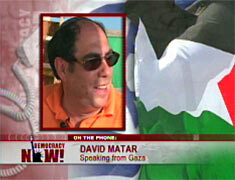
David Matar, settler
AMY GOODMAN: How many people are where you are right now?
DAVID MATAR: Well, along the strip of beach that includes the two communities of Shirat HaYam, Song of the Sea, and Kfar Yam, Sea Village, are about 1,000-1,500 people.
AMY GOODMAN: Are you planning to —
DAVID MATAR: But, of course -
AMY GOODMAN: Go ahead.
DAVID MATAR: But, of course, when you say that there are 8,500 settlers in the Gaza Strip and 1.5 million Palestinians, that is very misleading. I mean, you can say that there are 5 million Jews and 100 million Arabs in the Middle East, and thereby say that the Jews have no place there, they’re some illegitimate invading minority. If you put a focus on one area or another, you can always say that the Jews are a minority who have no place there, which is, of course, the Arab line. I notice that you have only myself representing the Jewish viewpoint, where you have two Arabs, one in America and one who you are interviewing from Gaza, and of course, in your follow-up, you quoted a Israeli radical left wing historian, who accepts the Arab line de-legitimizing the Jewish presence in the land of Israel. So, I want to protest at the outset that your reporting is skewed, and —
AMY GOODMAN: Well, we appreciate —
DAVID MATAR: The underlying message is that [inaudible] presence here is illegitimate.
AMY GOODMAN: We appreciate you joining us from Gaza. We’re also joined by Michael Bronner, a journalist who went to Gaza to spend time with settlers, as well as Israeli soldiers. And we’re going to talk with him in a minute.
DAVID MATAR: I also protest the word “settler.” “Settler” implies that we’re squatters who have taken other people’s land or property. That’s not the case at all. We are Jewish residents —
AMY GOODMAN: What do you call yourself?
DAVID MATAR: I’m a Jew who lives in the land of Israel. And this whole process of expulsion of Jews from communities — hello.
AMY GOODMAN: Yes, we can hear you.
DAVID MATAR: Expulsion of Jews from the communities in the land of Israel is — implies that there are places in this world where Jews are not allowed to live.
AMY GOODMAN: Well, David Matar, we’re going to go now to Raji Sourani, Palestinian Center for Human Rights.
DAVID MATAR: I don’t know if I want to debate or be involved even in direct conversation with Mr. Sourani.
AMY GOODMAN: We’re not asking you to debate.
DAVID MATAR: He’s part of an Islamic terror state, the same kind of people who knocked down the Twin Towers and are responsible for terror against America and all over the world. And the fact that you equate me with him or put us on the same so-called dialogue is really advocating even only passively Islamic terrorism, who is the enemy of the American people.
AMY GOODMAN: Well, David Matar, we’re going to go to Raji Sourani right now. We will come back to you. Raji Sourani of the Palestinian Center for Human Rights. Can you talk about the significance of this day and what David Matar had to say? Raji Sourani.
RAJI SOURANI: Hello? Yes?
AMY GOODMAN: Hi. Can you respond to what David Matar had to say and talk about the significance of this day in these few days, the deadline for the Israeli settlers to leave? Raji Sourani.
RAJI SOURANI: [inaudible] There is nothing special. There is nothing special, nothing unique. [inaudible] It seems there is total misunderstanding for the disengagement [inaudible]. The Israeli occupation will continue in its legal and [inaudible] form. What’s happening, this is unilateral disengagement [inaudible] decided by Sharon, and the occupation will remain, they will continue, they will keep controlling the borders, they will keep controlling the land. They will keep controlling the sea and the air. Gaza will be closed off. We will have no connection whatsoever with our people, relatives [inaudible] Jerusalem. The Gazans will be disconnected from the West Bank and Jerusalem, and their only contact with outside world, their only connection with the outside world [inaudible] will be under full Israeli control. And there will be no ports, no airport. It’s already in Gaza there is 60% unemployment.
AMY GOODMAN: Raji Sourani, we have a very bad line. We’re going to try to call you back. And we also have to break. And when we come back, we’ll continue with Raji Sourani of the Palestine Center for Human Rights; Michael Bronner, journalist who has spent time in Gaza talking to Israeli soldiers and settlers; and Ali Abunimah, founder of Electronic Intifada. David Matar has just hung up the phone, the settler who just recently moved to Gaza. We’ll try to ask him to come back on the phone.
[break]
AMY GOODMAN: We are talking about the Gaza pullout. Our guests right now are Michael Bronner, journalist who has done a piece for CBS News online about the situation in Gaza, just recently returned; Ali Abunimah, founder of Electronic Intifada, joins us in the Chicago studio; Raji Sourani of the Palestinian Center for Human Rights is joining us from Gaza. We’re trying to get David Matar on the phone, the Manhattan-born pediatrician who moved to Gaza and is on the beach now resisting the ouster of the settlers from the area. Michael Bronner, talk about your experience in Gaza.
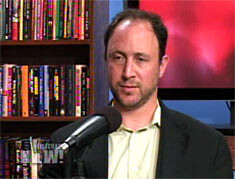
Michael Bronner, journalist
AMY GOODMAN: What was the soldiers’ — tell us some of what they had to say.
MICHAEL BRONNER: I think for the most part, the army just really doesn’t want to do this. For one, it’s not what armies tend to do in terms of dealing with their own citizens. They’re being asked essentially to become policemen. There are a lot of Israeli border police there, as well, who are better trained to deal with Israeli civilians. The army seems — there are two camps. There are a lot of religious soldiers; the backbone of the Israeli military to some degree is religious settler children and just religious nationalist soldiers. And then there are also — there’s been a refusenik movement for a long time for left-leaning soldiers who just don’t want to serve in what they see as the occupied territories. So there’s very, very mixed feelings on the part of the army, and there’s a pretty serious concern that soldiers won’t want to participate, either by actively refusing orders or just by passively kind of sitting it out while they’re there. That’s why they’re bringing sort of a mass number of soldiers. They’re bringing about 43,000 troops both to remove settlers and to defend against any attacks from the Palestinian areas.
AMY GOODMAN: Are the settlers — are the soldiers armed?
MICHAEL BRONNER: The soldiers that are going to be dealing directly with the settlers will be unarmed. And if you have been in that area, you never see an Israeli soldier without his M-16. So, they talked to me about how strange it feels for them to be in a tense situation without their weapons, but they got a chance to do that at some of the big protest rallies that have happened in the lead-up to the pullout. And then they will be —
AMY GOODMAN: Are the settlers armed?
MICHAEL BRONNER: The settlers have been given — you know, when they were living there, they were given arms by the Israeli military to defend themselves. Most of them have turned their weapons in. The Israeli military has been collecting them. I’m sure that many of them still have arms. The soldiers in the protective rings are very heavily armed, and they’re the ones - there are five or six brigades that are ready to reoccupy all of the Palestinian areas from Gaza City to Khan Yunus, all of the Palestinian areas, if there is significant rocket or mortar fire during the pullout effort.
AMY GOODMAN: Ali Abunimah, speaking to us from Chicago, founder of Electronic Intifada, your response to the situation right now, to the beginning of the Gaza withdrawal?
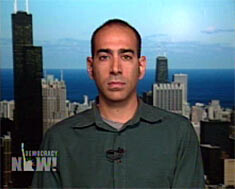
Ali Abunimah, The Electronic Intifada
What’s going on here, really, I think are two things that really we have to focus on. During the period that Israel has been talking about destroying 2,000 settler homes in the Gaza Strip, it has been building more than 6,400 settler homes in the occupied West Bank. Last week, for example, it issued tenders for 72 Jewish-only housing units in the settlement of Betar Illit near Bethlehem. Israel is continuing to build the apartheid wall in violation of international law throughout the occupied West Bank. It announced a month ago, the wall - the route of the wall in Jerusalem, dividing 55,000 Palestinians in occupied East Jerusalem from their family, friends, places of work, schools, hospitals, in the heart of occupied Jerusalem.
All of this is going on while Israel is trying to get the world’s attention focused on Gaza, and we have seen some very, very shady stuff going on. The settlers, like Mr. Matar, Dr. Matar, who have been enjoying the land, the resources of Gaza for decades, are receiving massive compensation packages of up to half a million dollars per family. Just in the past few days it was revealed that the settlers, in addition to all of the compensation they’re receiving from the Israeli government, are getting an additional $14 million from private donors, including James Wolfensohn, the former World Bank head, who is the U.S. envoy to Gaza, in order to pay for the hothouses they have built on stolen Palestinian land in Gaza.
Meanwhile, Mr. Matar said that this is about not allowing Jews to live wherever they want. Let’s recall that 80% of the population of the Gaza Strip are Palestinian refugees, who have been forbidden for the past 60 years from returning to live in their homes in Jaffa, Haifa, Akko and hundreds of other villages from which they were forcibly expelled. I’d like to say to Mr. Matar and any other person listening who sympathizes with his views, as a Palestinian, I would welcome any Jew to live in my country on equal terms, as an equal citizen, not as an armed settler, not as someone coming to rule us and take our land by force, and it’s amazing to me that Dr. Matar has the freedom to move from New York, where he was no doubt living a comfortable life, and take up residence in the Gaza Strip, whereas I, like the vast majority of Palestinians, have no right even to visit our own country.
AMY GOODMAN: Ali Abunimah, founder of Electronic Intifada. Can you talk about the settlers who are there, Michael Bronner, and your response to what Ali Abunimah had to say?
MICHAEL BRONNER: A couple of responses to what he had to say. I mean, I think that, in general, the population in Israel doesn’t believe that this is about the peace process, this unilateral withdrawal, or that it will lead to peace anytime soon. I think some people are hoping that maybe it will be a catalyst for something down the road, but I don’t think that anyone’s very optimistic that this will be an immediate catalyst for peace, but in terms of theater that he mentioned, there’s — without detracting from the, you know, the real difficulty that people are having leaving their homes, there’s a lot of theater to this, especially the more radical settlers like Dr. Matar, they’ve been telling - There are thousands of journalists, there are, some say, about 4,000 journalists. And the image of settlers being dragged from their homes or pulled from their homes is an image that they really want to have, and there’s almost a sense that, you know, they’re being taken to some place far worse than down the beach where they’re going, where the new settlement is being built for them, the new community.
AMY GOODMAN: Well, what about this, where they’re going?
MICHAEL BRONNER: Well, some of them will go to a new village that’s being built between the two cities a little bit further north, Ashdod and Ashqelon, but in truth, there are not contingency plans for everyone. A lot of them will go to hotels, and there’s really no coherent plan for all of them. An Israeli soldier told me that for the most part, the school year will be a wash for most of the settlers’ children because the school year starts in just a couple weeks in Israel.
AMY GOODMAN: Michael Bronner mentioned, Ali Abunimah, the journalists, the thousands of journalists that are there. On your website, you have a letter by Jonathan Cook, “How to Cover Disengagement.” Talk about it.
ALI ABUNIMAH: Yes. I mean, it’s one of the amazing things that this theater and this show is being covered, as you mentioned, by thousands of journalists. Palestinians feel very much on the sidelines. This is a theater piece carrying — being carried out among Israelis and among Jews. And meanwhile, Palestinians are being killed. Their homes are being destroyed. Their land is being confiscated for settlements. The wall is continuing to destroy the lives of hundreds of thousands of Palestinians. None of this has stopped even for a minute, because all of the attention is on Gaza. So, that letter from Jonathan Cook was to point out - he had been asked to go to Gaza and cover it. He said, you know, ‘I’d much rather cover what’s going on in the West Bank or in Israel that’s not being covered: Israel’s continued unrelenting assault on the Palestinian people.’
And there’s another aspect to the theater which I think is just as important, which is the reported Palestinian celebrations. We have seen Mahmoud Abbas, the Chairman of the Palestinian Authority, heading to Gaza. An important part of this theater is the Palestinian Authority trying to claim credit for the Gaza disengagement, when in fact the Palestinian Authority has had absolutely nothing to do with it. And the unspoken truth here, the politically incorrect truth that none of us are supposed to acknowledge, is that the only reason Israel has contemplated even this limited disengagement from Gaza is because of the unrelenting resistance to the occupation. So the Palestinian Authority is trying to present this as a result of its efforts and as a result of its efforts to crush Palestinian resistance to the Israeli occupation, whereas I think there’s a much broader understanding among Palestinians and in the wider Arab world, that Israel is only leaving Gaza because of the resistance and that that is the same lesson we learned in Lebanon in May 2000, that Israel never leaves occupied territory, never even contemplates it, unless the cost of holding onto it is made too high.
And if we don’t want resistance, if we don’t want violence, then the international community has to take up its obligations to say to Israel, “You must stop building the wall now. You must dismantle it in accordance with the International Court of Justice resolution, and you must immediately stop the expropriation of land, the demolition of homes, the creation of new Palestinian refugees.” Every day that passes, Israel is creating new Palestinian refugees, and instead of the world standing up to stop Israel doing that, they’re colluding with this theater in Gaza, giving millions of dollars to the settlers and trying to promote the fiction that this is part of some bigger peace process, when I think, as Michael Bronner acknowledged, most Israelis don’t believe that. And we see the Bush administration saying in the past day or two that they hope that this will lead eventually to revival of some kind of peace process, but clearly there’s no intention on the part of the Bush administration to move quickly to force Israel to end totally and completely the occupation in the West Bank, Gaza Strip, and East Jerusalem or even the Gaza Strip.
And last - a few days ago, the Financial Times reported that Israel has threatened to cancel its free trade agreement with the Palestinian Authority if the Palestinian Authority continues to insist that Israel should withdraw from the border between Gaza and Egypt. Israel is maintaining the occupation. They’re simply moving it to the edges. Palestinians in Gaza will not be free. I certainly sympathize with any Palestinian who is happy to see the back of the settlers, those like Dr. Matar, who are motivated by this extremist racist hatred. But if you are being strangled, and your priority is to get a gulp of air, that’s how many Palestinians feel right now. But a gulp of air is not the same as freedom. It’s not the same as life. It’s not the same as an end to the occupation and an end to the apartheid system that Israel is continuing to build with the collusion of the international community and the full backing of the United States.
AMY GOODMAN: Ali Abunimah of Electronic Intifada. Michael Bronner, when you were covering the situation in Gaza, you had an exclusive interview with the Israeli Brigadier General of the IDF, the Israeli Defense Forces, in charge of this, and also saw how soldiers were being trained, films they were shown, etc. Talk about that.
MICHAEL BRONNER: Well, I had a chance to sit down with Brigadier General Uzi Moscowitz, who is in charge of the - he’s one of two commanders in charge of the pullout. He’s in charge of the northern section and then also defense, if there are attacks from Hamas or Islamic Jihad during the pullout. And it was interesting. I mean, he was very tense when he was talking about the prospect of having to reoccupy all of the Palestinian areas. It’s something that the army definitely doesn’t want to do in terms of international image, in terms of casualties, in terms of stress on regular Palestinians who for the most part have nothing to do with the attacks. And he seemed less concerned with the prospect of Israeli soldiers not being able to go through with removing citizens. That, he seemed to think, would be no problem. They have got 43,000 troops. If any sit out, they’ll just put more in, and they’ll be able to do this job.
I actually got a chance to look at some of the video from the 1982 pullout from the Yamit settlement, which was part of the peace deal with Egypt, when they pulled out a settlement in the Sinai. And all of the soldiers that are going to be participating in the withdrawal were able to see that, as well. And one thing that is interesting is you do see soldiers that are traumatized and stressed by having to drag out Israeli settlers. And you do see settlers who are very upset at leaving their homes and, you know, some that are saying angry things to the soldiers. But you also hear in the background soldiers kind of jeering each other, and I think once the initial shock — there’s been so much buildup about how stressful this will be for the soldiers and for the settlers, that once it actually starts, I think that they’ll just do it, and there won’t be a huge amount of trouble. Even if there’s extreme violence from some of the extremist settlers, I don’t think that it’s anything that the military can’t handle. And they’re much more concerned with fighting between the IDF and the Palestinians.
AMY GOODMAN: Will Dr. Matar be among those who stay? I wish we could be asking him this, but he hung up on us.
MICHAEL BRONNER: Well, he, like some of the more radical settlers, he has a very well planned out scenario to enact this day. I mean, he plans on, he told me, chaining himself to something. He didn’t sound chained to something when we were talking to him but, you know, I think a lot of people will passively not participate or they’ll force the soldiers to drag them out. I don’t think that that many will physically harm the soldiers. These are the soldiers that have been protecting the settlers that have lived there for many years. And they’re really so well integrated in the population that I don’t think that there will be all that much violence against soldiers.
AMY GOODMAN: In our last minute, Ali Abunimah, last word.
ALI ABUNIMAH: Well, it’s touching, the media’s focus, the thousands of journalists, on the psychological trauma for the settlers and soldiers. You know, every day Palestinians are being dragged out of their homes, being shot by the army. The Israeli army is always armed when it approaches Palestinians. Their houses are demolished. Their lands are confiscated. They’re cut off by the wall from friends and family. And we haven’t seen this international concern over what the trauma is like for the Palestinians undergoing this, particularly not by the mainstream American media. So, you know, let’s focus on the whole picture here, which is that the occupation isn’t going to end. This is another one of those historical turning points that we have seen so many of in the Middle East, like the Oslo Agreement, or like the many turning points in Iraq. It doesn’t change anything on the ground. It doesn’t bring us closer to peace. And unless there is a full international confrontation with the Israeli government to force it to end the occupation completely, this simply marks the beginning of another phase in this terrible conflict that we in the United States have fueled, funded and subsidized for so long.
AMY GOODMAN: Well, Ali Abunimah, I want to thank you for joining us from Chicago, Founder of Electronic Intifada. Michael Bronner, journalist, has just returned from Gaza, covering the settlers and the Israeli military. His piece appears online at CBS News online. David Matar was with us, the pediatrician who had gone to Gaza with his family in the last few months to resist the Gaza pullout, and Raji Sourani of the Palestinian Center for Human Rights. We’ll try to get him back on. The line was just too bad from Gaza, but we will certainly continue to cover this over these next few days.
Democracy Now! is a national, daily, independent, award-winning news program airing on over 350 stations in North America. Pioneering the largest public media collaboration in the U.S., Democracy Now! is broadcast on Pacifica, NPR, community, and college radio stations; on public access, PBS, satellite television (DISH network: Free Speech TV ch. 9415 and Link TV ch. 9410; DIRECTV: Link TV ch. 375); as a “podcast,” and on the Internet. To purchase an audio or video copy of this entire program, click here for Democracy Now’s new online ordering or call 1 (888) 999-3877.
Related Links